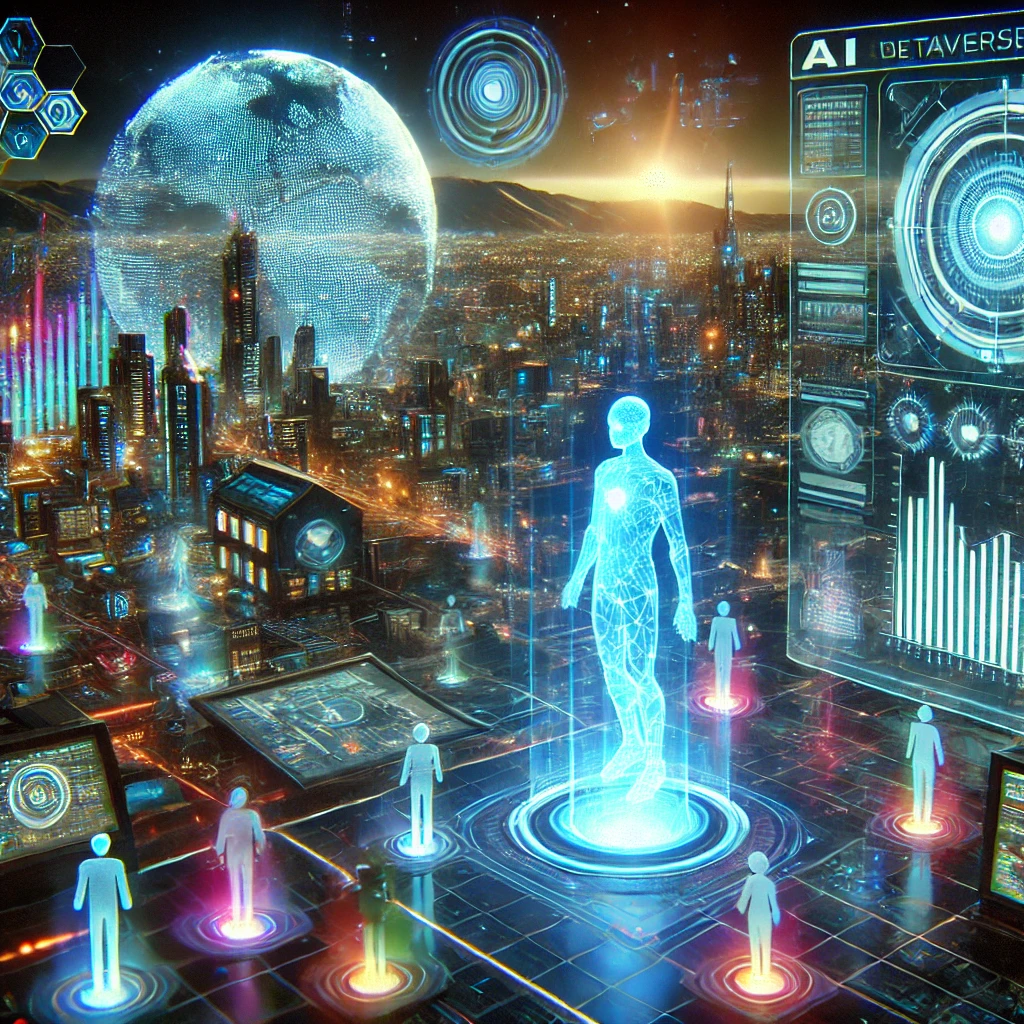The emergence of the Metaverse and Virtual Reality (VR) is transforming the way we engage with digital worlds. The technologies are increasingly immersive and intelligent, due to the use of Artificial Intelligence (AI). AI is important in making virtual worlds more realistic, interactive, and personalized. This blog delves into how AI is redefining the future of the Metaverse and VR, the applications that matter, and what is in store for this revolutionary merging of technologies.

The Link Among AI, Metaverse, and VR
The Metaverse is a huge, networked virtual universe where users can work, play, and socialize. Virtual Reality is an essential element of the Metaverse, delivering users with engaging experiences. AI is the pillar of these experiences by facilitating automation, intelligence, and responsiveness in virtual worlds. It drives virtual assistants, boosts graphics, creates dynamic content, and tailors user interactions, making the Metaverse more interactive and lifelike.
Key Functions of AI in the Metaverse and VR
- Developing Realistic and Intelligent Avatars
AI facilitates the development of highly realistic avatars that mimic human expressions, movements, and behaviors. Through technologies such as deep learning and computer vision, AI interprets users’ facial expressions, speech, and gestures to develop avatars that react in real-time. This makes social interactions in the Metaverse more realistic and lifelike. - Advanced Natural Language Processing (NLP)
AI-powered NLP enables users to interact smoothly with virtual objects and other players. AI-based chatbots and voice assistants utilize NLP to interpret and react to inquiries, so interactions in the Metaverse are more natural. This is needed for social interactions, customer support, and gameplay in VR environments. - AI-Powered Virtual Environments
The Metaverse is comprised of enormous, dynamic virtual worlds that need constant updating and optimizing. AI supports procedural content generation, which creates dynamic environments, interactive objects, and dynamic narratives without human interference. AI further boosts VR experience by creating hyper-realistic worlds that respond to user actions and tastes. - Enhanced Computer Vision for Object Recognition
Computer vision powered by AI assists VR systems in identifying and understanding physical movements, gestures, and environments. This increases the accuracy of motion tracking to provide smooth interaction between users and virtual objects. AI also supports hand-tracking and eye-tracking technology, enhancing user immersion in VR. - Personalization and Adaptive Experiences
AI gathers and processes user information to make VR experiences more personalized. From gaming, virtual conferencing, and e-commerce, AI personalizes content according to user behavior and interests. Personalization increases interaction by presenting users with content, products, and experiences that are of interest to them. - AI in Virtual Assistants and NPCs
Virtual AI-powered assistants give users directions and assistance in the Metaverse. Intelligent NPCs in games and simulations are driven by AI and engage sensibly, providing authentic conversation, help, and challenges. These AI NPCs can have learning capabilities, enhancing the experience and making it more interactive and real. - AI for Security and Moderation
As social interactions increase in the Metaverse, safety and security are ensured by AI. AI-based moderation platforms identify and block inappropriate content, hate speech, and cyber attacks. It also augments digital identity verification and fraud protection, which makes virtual platforms secure for users. - AI and Blockchain Integration for the Metaverse
AI and blockchain technology together enhance the Metaverse’s transparency and security. AI-driven smart contracts automate virtual transactions, ensuring fair dealings within digital marketplaces. AI also aids in monitoring decentralized spaces, detecting fraudulent activities, and improving data security in VR environments.
AI’s Impact on Key Metaverse and VR Industries
Gaming and Entertainment
AI-driven VR games adapt to player strategies, offering personalized challenges and intelligent opponents. AI enhances character animations, soundscapes, and environmental interactions, making gaming experiences more immersive.
Education and Training
AI-powered VR simulations provide interactive learning environments for students and professionals. Medical trainees, for example, can practice surgeries in AI-driven VR simulations, while corporate employees undergo virtual skill development sessions.
Retail and E-Commerce
AI facilitates individualized shopping experiences at virtual malls. Consumers can chat with AI-driven virtual assistants, virtually try on clothes using VR, and receive personalized recommendations from browsing history.
Healthcare and Therapy
VR therapy powered by AI is applied to mental illness treatment, pain relief, and rehabilitation. AI adjusts virtual therapy sessions according to patient feedback, providing customized treatment plans.
Work and Collaboration
AI-powered automation tools enable virtual workspaces in the Metaverse. AI-driven VR meeting assistants summarize conversation, transcribe speech, and make smart suggestions, enhancing workplace productivity.
The Future of the Metaverse and VR AI
The application of AI in the Metaverse and VR will keep growing as technology advances. The future promises intriguing developments which are followings:
- Better AI Ethics and Laws to promote accountable AI use in virtual environments.
- Tighter, more realistic AI Avatars with hyper-realistic interactions.
- AI-Driven Metaverse Economies with more intelligent virtual shopping centers.
- Seamless Brain-Computer Interfaces (BCIs) based on AI for greater immersion in the Metaverse.
Conclusion
AI is transforming the Metaverse and VR by making them smarter, more immersive, and interactive. From life-like avatars to AI-enriched environments, tailored experiences, and security upgrades, AI is the driving force behind the future of digital evolution. As AI technology continues to evolve, the Metaverse and VR will become increasingly immersive, opening up limitless opportunities for work, play, learning, and social interaction. Adopting AI in these virtual worlds is not only a choice—it is the solution to building a smarter, more interconnected virtual world.
